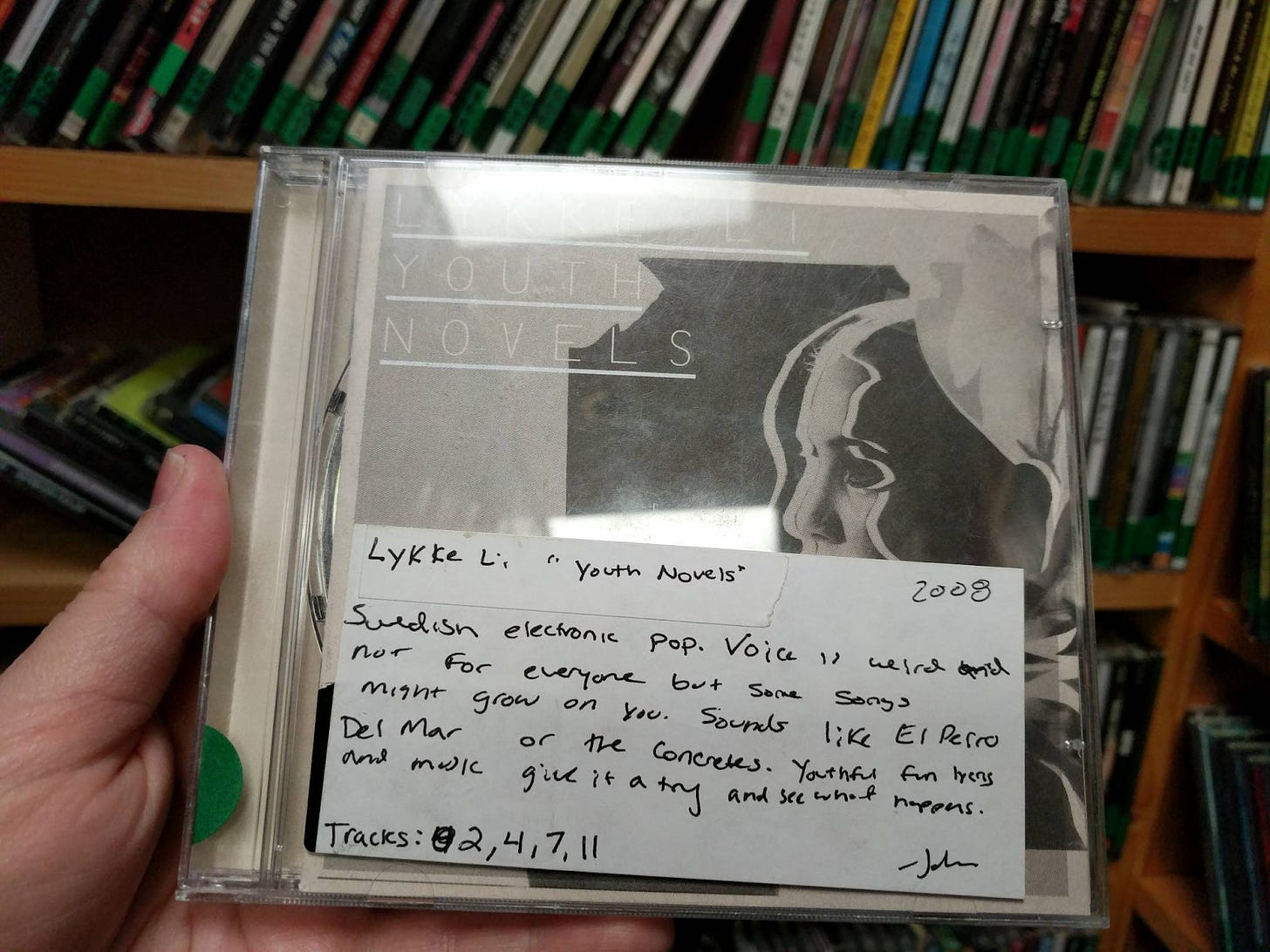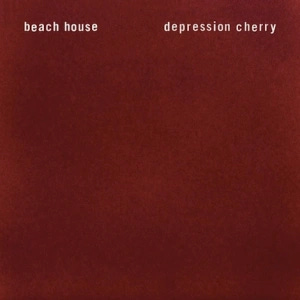My First Album Review
What I thought of a certain beloved album then, what I think of it now, and the state of "criticism"
What’s the first album that you, in some capacity, wrote about? Why? Where did that writing go? As unpleasant as it is to look back on any writing I’ve ever done, even writing that’s just a few years old, I got the idea to do a little archive of my writing and tastes during a conversation with a Twitter buddy who remembers being tasked with reviewing Gregory and the Hawk early in his days at WKNC. His actual first review was of Youth Novels, the 2008 debut album from Sweden’s own Lykke Li. He spun the promo CD and wrote a quick paragraph, calling out a handful of favorite tracks.
It made me reflect on my own first “review,” a laudatory report on Beach House’s beloved 2015 album, Depression Cherry. I’d been following the album cycle since “Sparks” dropped mid-summer; I learned of its release while driving home from a particularly grueling shift at a pizza joint in town. I wept, partially out of exhaustion. I was 18 and I desperately wanted out of my hometown. I was obsessed with “Sparks;” even after the rest of the album dropped, I mostly wanted to hear “Sparks.”
This was the same summer where I saw two of my favorite concerts I’ve seen to date: Elvis Depressedly/Mitski/Gabby’s World/Small Wood House and Mr. Twin Sister/Moon King/Sammy Slims, both at Mahall’s. Having a venue like that on the same block as my parents’ house proved too convenient for me. The all-ages shows here enabled my habits of finding, obsessing, and identifying with a new indie-band-of-the month. I took that personality to Kenyon College that fall.
Kenyon’s an easy place for a music obsessive. There’s a student-run venue on campus, a radio station where it’s not competitive to get a show slot, an onsite recording studio, and, importantly, a student-run music blog. I was involved, in varying capacities, in all of these, minus the studio. Discovering, sharing, and evaluating music became a round-the-clock hobby for me. It’s at WKCO’s blog that I started writing content: album reviews, longform pieces, themed playlists, the like. I was an extremely casual reader of other blogs, so when it came to writing something like an album review, I really didn’t have much exposure to the “review” as a process. But I tried!
I couldn’t have been more excited to contribute a Depression Cherry review. Ever since discovering Beach House in 2012 through hits like “Myth,” “Zebra,” and “Lazuli,” then seeing them perform with Wild Nothing, I’d been obsessed. I still am. Their approach to dream pop is an intoxicating mix of beauty and haunt. Victoria Legrand’s contralto is hypnotic. She and her collaborator Alex Scally have identified a sweet spot in dream pop: how to make the music feel cinematic on record and immersive in live settings with universally appealing hooks that do not overshadow the depth of their craft. Their live performances are subtle, even mysterious, reinforcing the primacy of craft. When I last saw them in 2022 in Pittsburgh, I was just as transfixed as I had been ten years prior.
Terrible title. The review itself reads like a book report. It’s unfortunate. But I can hear my excitement. I was, first and foremost, impressed by Depression Cherry’s track ordering. I still think it’s perfect. “Levitation,” with its gradual opening and perpetual crescendo, is one of the strongest openers of the 2010s. Starting a dream pop record with refrains of “there’s a place I’d like to take you” is like catnip for college stoners. I celebrated just about every track, especially “Wildflower,” whose beat I still find really alluring, and I shat on “Bluebird” for whatever reason. Today, it’s not my favorite, but I’d be pressed to find true fault in it, and I think its subdued, eerie character fits well in the track ordering.
I spent maybe too much of the review commenting on how Depression Cherry is, arguably, “smaller” than Teen Dream or Bloom. Thanks, in part, to the use of live drums on Bloom especially, the prior two Sub Pop albums were big, bold, cathartic experiences, way more dramatic than anything on their self-titled or Devotion. It filled up the room at a time when indie rock and indie rock with this kind of drama was beloved. After touring Bloom, Beach House took their time making Depression Cherry, waiting for creativity to strike them in the right light, and reduced the live drums’ influence. Where they appear, they act more like a foundation than a visible component of sonic architecture. It was a smart choice. The indie world’s fascination with smaller and smaller sounds bled into pop in a fascinating way. The favored music of the mid-’10s just wasn’t that big. Subtleties and interiorities caught ears. Depression Cherry had just the right amount of subtlety.
I had no way of knowing then that Depression Cherry would be the social media sensation it would eventually become. As I write this, “Space Song” is just 640,000 streams away from 800 million, most of which came in the last two years when Tik Tok users found the song ideal for portraying dramatic irony of emotion. Much like “Lazuli” and other Beach House hits, their arpeggiated synths beget a sense of wonder. Nowadays, if you ask me which track is the masterpiece off Depression Cherry, I’m more likely to say “PPP:” Legrand’s ballad-like vocals are immediately calming and the last minute-and-a-half of sweeping instrumentals and “ahhs” are just gorgeous. This is the sound of a band who understands they’ve struck a nerve: beloved by critics, indieheads, and enthusiastic young throngs alike, Beach House can command a room with something as woozy as dream pop.
Today, I mostly revisit Depression Cherry when I want to do a whole dive on Beach House. The album, like the rest of the Beach House discography, floods me with memories of high school and early college. As admirable as the craft on songs like “Norway” and “The Hours” are, I’m not interested in coexisting with those memories all that often. I’m in my nostalgia-is-toxic era.
It was at WKCO that I got enthusiastic about listening to an album, reading up on its context, and trying to share an honest evaluation from my perspective. Slowly, I got better at it. I still feel my reviewing chops strengthening over time; even my first paid review feels kind of elementary. The bulk of music writing I’ve actually done is still with Slumber Mag and I’m grateful that the editors there pushed for a more personal, diaristic form of writing. It’s a different way of engaging. Reviews are hard to write; criticism is a form of expression that requires careful study, trial, and arguably, error. I have to imagine that it’s embarrassing to commit any of those “errors” on a large platform.
I’m writing this on August 3rd, a day when a major blog dropped a critical review of an influential artist’s first solo album. The artists’ fans, a crowd which includes other figureheads of Big Indie, came together on X (ugh) to denounce criticism and publications that specialize in it. It gained traction; this line of thinking always does. Whether it’s coming from a major figurehead like Halsey or Lizzo (lol) or someone who emerged from the indie sphere, anti-critical stances gather steam from audiences who want to see their favorite musicians celebrated. That’s a reasonable thing to want. But it’s not a reasonable thing to expect.
I’ve read reviews that I think are “bad:” reviews that are clearly influenced by racism and/or misogyny, reviews that willfully misinterpret lyrics, reviews that refuse to engage with the context of an album, and not all of these reviews are critical. Sometimes, a badly written review is quite reverent. That’s all to say: this review isn’t badly written. The evaluations are honest, reasonable conjectures. It’s written responsibly.
I’m not necessarily going to sit here and say that I hope to, personally, spend the rest of my waking days writing album reviews. It’s fun, but it’s not always my favorite way to engage with music writing. But, even in this exercise, I had some fun looking back at my own bad writing and reflecting on Depression Cherry’s trajectory. Today, Beach House is as close to a household name as you might expect from a contemporary Sub Pop artist. It’s just cool to see.
What am I listening to now?
Apollo Vermouth - Forever Back There (ambient, drone, field recording)
Being Dead - When Horses Would Run (rock, art pop)





